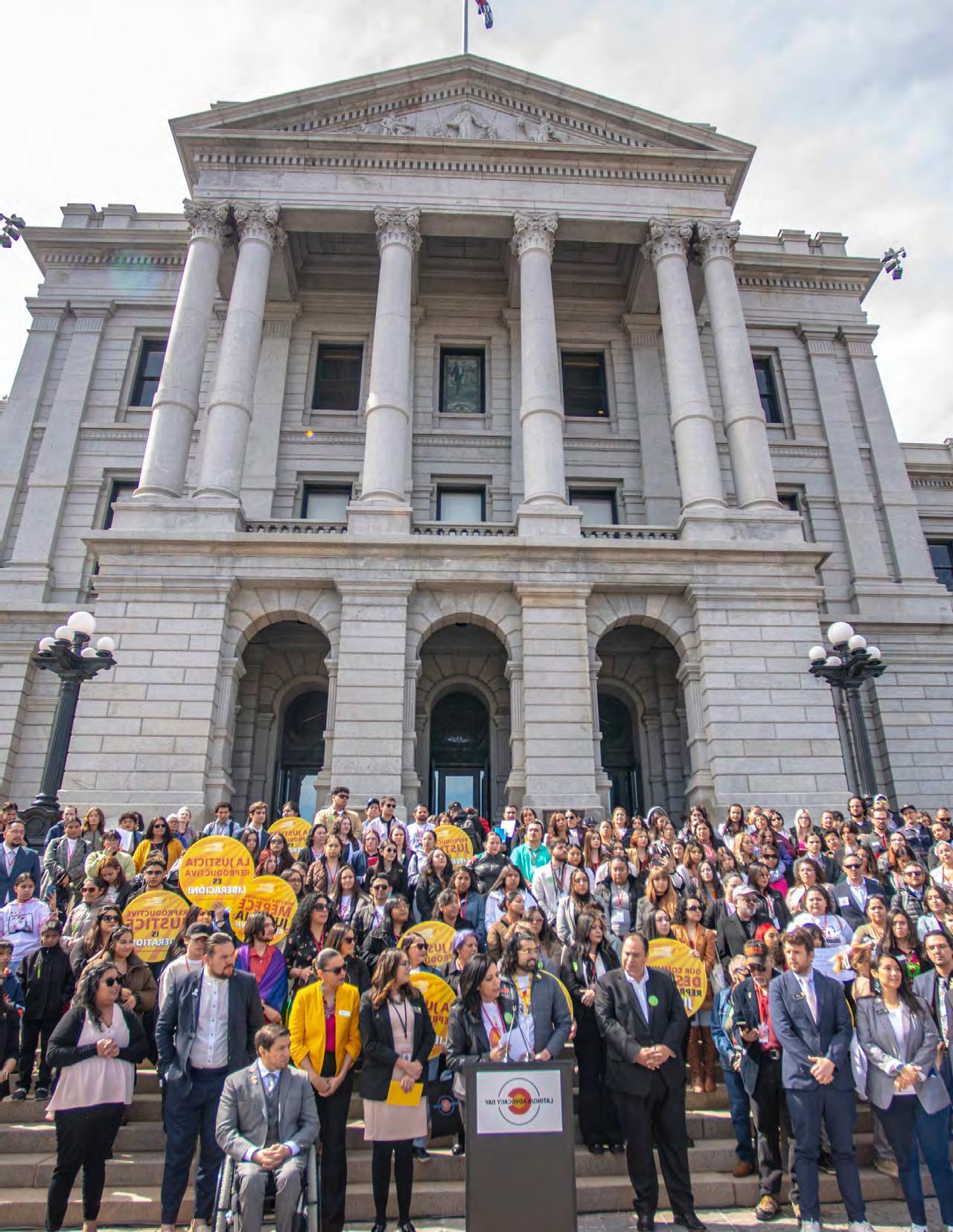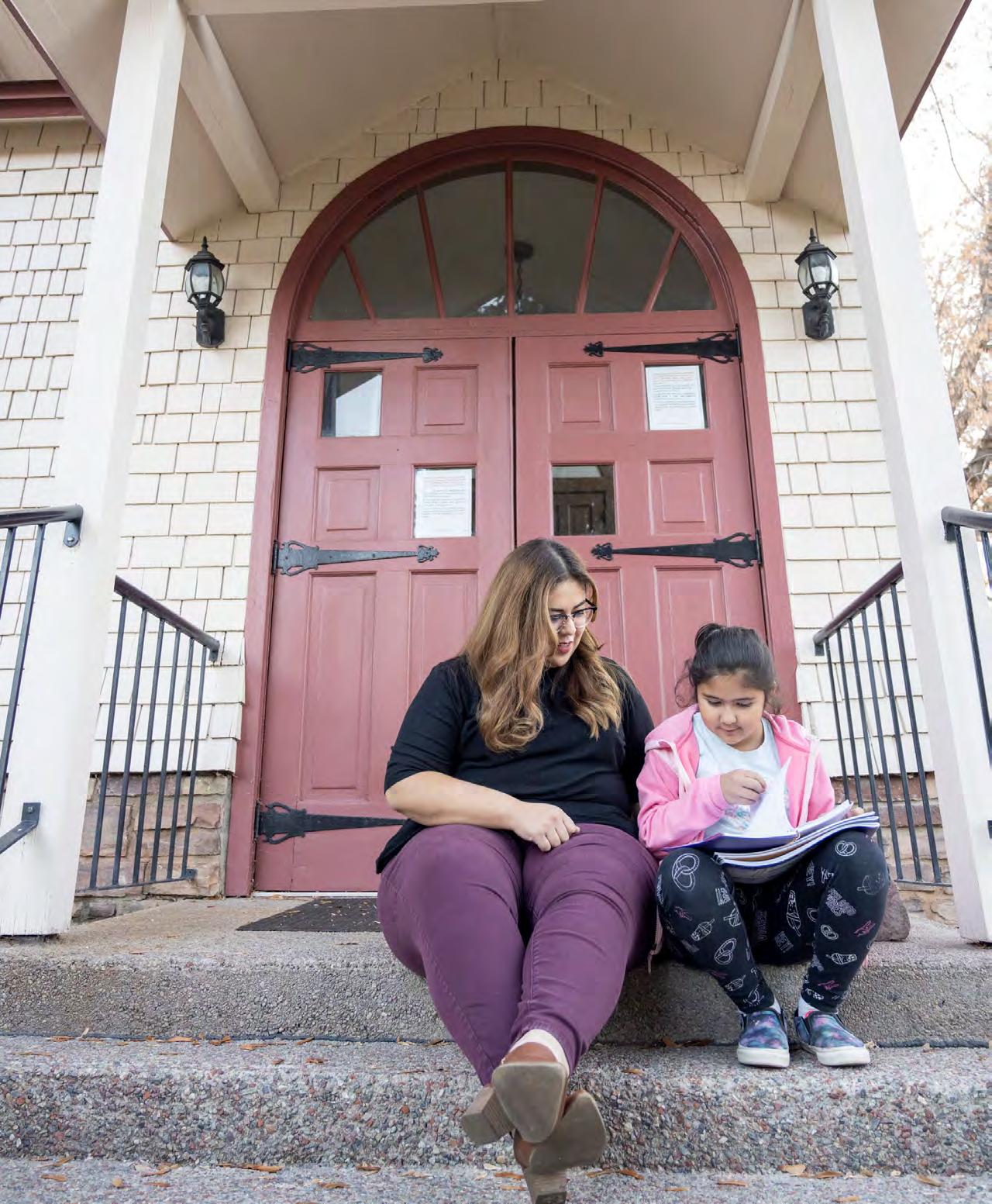

EXECUTIVE SUMMARY
Launched in 2021, the Colorado Latino Agenda (CLA) is a statewide public research initiative co-led by Voces Unidas and Colorado Organization for Latina Opportunity and Reproductive Rights (COLOR) that publishes relevant and timely in-depth reports about Latinas and Latinos in Colorado.
The Colorado Latino Policy Agenda (CLPA) is our annual, nonpartisan report designed to provide insights into the demographic makeup and views of Latino voters in Colorado on pressing policy, political, and social issues.
The 2023 CLPA is informed by a statewide poll of 1,600 Latino registered voters, which provides a representative, nonpartisan snapshot of views of the second-largest and second fastest-growing ethnic voting bloc in the state. This report summarizes the main findings and policy preferences, offering a valuable, ongoing look at the state of Latinos in Colorado at the statewide, regional, and congressional district levels.
Latino voters’ top priorities this year continue to be dominated by economic concerns, likely exacerbated by the period of severe economic challenges, including rising prices for goods and services, that played large roles in the 2022 election season. Colorado has also experienced significant increases in housing costs, with rent and home purchasing prices outpacing wages as the population growth in the state continues to outpace national averages.
Economic issues were major concerns at the federal level in last year’s survey as well, with “addressing the rising cost of living and inflation,” “the economy,” and “improving wages and income” holding the top three spots among priority issues. Latinos were hit disproportionately hard by the COVID-19 pandemic and it’s evident that they are still emerging from the associated economic challenges as inflation outpaces the wages and income levels of the community in
2023. A third of respondents in 2023 say they have not seen any improvement in their financial situation over the past year while another third reports their situation has gotten worse since 2022.
Those economic concerns were widely echoed at the state level, where 40% of respondents identified “addressing the cost of living” as the top concern for the Governor and State Legislature to prioritize in Colorado. Mimicking the federal priorities, this is followed by “improving wages and income” at 30%. “Addressing affordable and sustainable housing” ranked slightly higher as a priority for state policymakers than federal, with 19% of Latino voters identifying it as a top priority – yet another indicator of the importance of economic policy interventions to the Latino community.
Notably, there is overwhelming support for every policy intervention included in the survey aimed at reducing housing costs and making housing more accessible, with nearly all having above 70% support among Latino registered voters – independent of region, congressional district or political views. Recognizing the importance of placing affordable housing in areas where there is existing demand for housing, a robust 85% of Latino registered voters agree that “cities and towns should be required to build more affordable housing near jobs, schools, and public services.” There is comparatively strong support for policies reforming renters’ rights and creating legal protections to prevent unjust evictions of renters (see figure 5).
Addressing gun violence at the federal level is a top concern for 22% of Latino registered voters in Colorado, making gun violence a recurring priority for Latinos (30% of the sample in 2022 identified gun violence as a top concern). While the percentage was slightly lower at the state level (20%) this year, gun violence remained among the top five most important issues facing the Latino community at both
KEY FINDINGS
TOP 4 At the local and the national level, four of the top six most-important issues identified by Latino voters for elected officials to prioritize relate to economic concerns , with “addressing the cost of living/inflation” topping the list for Congress and the President as well for the Governor and State Legislature.
34% More than a third of Latinos in Colorado say they “cannot afford” or “can barely afford” where they live “Improving wages and income” is also seen as a top priority at both the federal and state levels, as is lack of affordable and attainable housing.
#3 Homelessness this year emerged as the third-ranked priority for state officials.
#4 Lowering healthcare costs is a top-four priority at both the state and federal levels.
52% Latino support for protecting women’s reproductive health and abortion rights in Colorado remains strong More than half say abortion bans/ restrictions in other states make them more likely to vote in 2023.
81% Addressing gun violence and mass shootings also remains a top-five priority for Latinos in Colorado for both state and federal officials. An alarming 81% of respondents say they are concerned about the prospect of a mass shooting that targets the Latino/ immigrant community.
concern about the prospect of a mass shooting that targets the Latino/immigrant community.
Moving toward election season, support for protecting reproductive health and abortion rights currently outnumbers support for banning or limiting abortion by a sizeable 4-to-1 margin at the state level; and an even greater margin (4.5-to-1) at the federal level, where it landed among the top five most important issues for Congress and the President to address. What’s more, protecting abortion rights appears to be a mobilizing force for Latino turnout, with 52% of respondents saying laws passed around the nation to limit or ban abortion make them more likely to vote in 2023. When asked to evaluate a potential abortion-related ballot measure, a solid majority of those polled (62%) reported they are likely to support making abortion rights stronger in Colorado by allowing state-funded insurance programs to cover abortion costs.
Education policy is among the top priorities for Latino registered voters at the state level, with general agreement that the state’s education system needs to improve. For example, 77% of Latino voters are concerned about the quality of education in the state and 76% are concerned that “school board members are more focused on imposing their political ideologies on young people than student achievement.” The lack of diversity in school staff and leadership is a concern for 67% of Latino voters.
the state and federal levels. The prevailing highly polarized political climate — including politicians using language that encourages discrimination and violence against immigrants — worries Latino voters as we approach the 2024 election, with 81% expressing
Immigration policy is also projected to be an important theme of the upcoming election cycles, reflected by the increased support for immigration reforms in this year’s survey. Latino voters in Colorado continue to rank protection of immigrant rights as a top policy priority for federal officials. This year, we gauged opinions on immigration policies for the first time, a baseline that shows high support for humane and common-sense minded reforms. That includes 80% agreeing that the federal government should do more to support undocumented immigrants “who have lived, worked and paid their taxes in the U.S. most of their lives.” Latinos are also supportive of Congress
passing laws that provide a path to citizenship to farmworkers (77%) and Dreamers/DACA recipients (73%). And 70% of respondents agreed that if Congress refuses to take action, President Biden should provide legal permits to allow undocumented immigrants to live and work in the U.S. without fear of deportation.
The Latino electorate has had significant influence in recent federal and state elections and continues to outpace other racial groups in growth in eligible voter population in Colorado. However, the 2023 survey reinforces findings from 2021 and 2022 that mobilization and outreach is not where it should be to see Latino voter turnout reach its full potential. According to this year’s survey, half of Latinos have not yet been contacted by anyone about registering
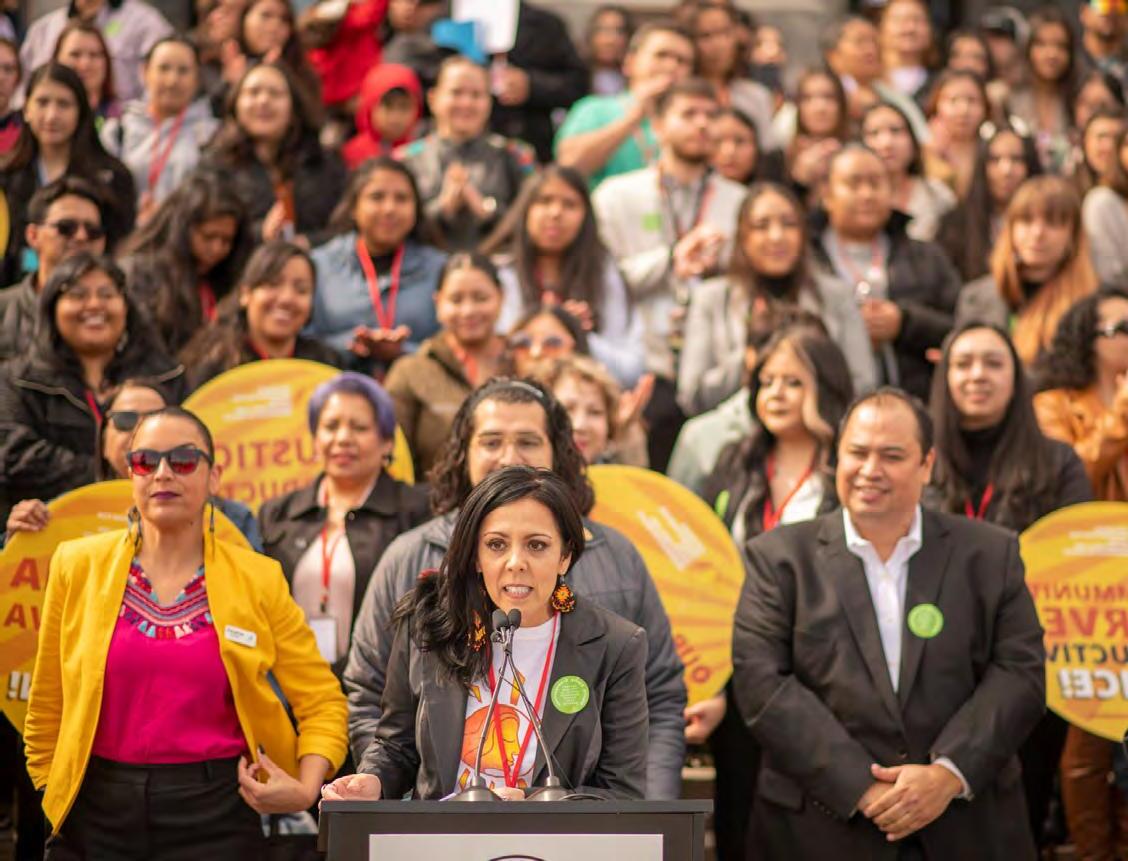
or voting, with “friends, family and co-workers” credited for outreach to those who have.
The annual Colorado Latino Policy Agenda is designed to be of high value to community leaders and elected officials at the federal, state, and local levels. Policymakers can look to these findings to more directly engage the Latino community in policy decisions, as the research makes clear that Latinos desire to be more involved in public policy and political discussions, but often feel that their views and voices are excluded from the decision-making process. The 2023 Colorado Latino Policy Agenda offers an opportunity to explore areas of agreement and work together to design and deliver appropriate and timely policy solutions for the state’s growing Latino population.
RECOMMENDED POLICY ACTIONS

The following issues received support from at least two-thirds of respondents in our 2023 survey.
We are highlighting these popular policy preferences to encourage action from communities and policymakers.
Top Policy Preferences of Latinos in 2023
POLLING SUMMARY
ABOUT THE POLL
BSP Research, a national firm with 20-plus years of helping community-based organizations research a diversifying United States, fielded a nonpartisan statewide poll of 1,600 Latino registered voters in Colorado focused on their issue priorities, policy preferences, and political values. The poll was conducted from July 1- July 27, 2023, in both English and Spanish. The margin of error was ±2.4%. The poll was designed to oversample in rural areas to provide the opportunity to compare results across four main geographical regions of the state and congressional districts, when possible. Relatively small population density across some districts led to fewer than 100 completed interviews in CD-5 , CD-6 and CD-7.
Dr. Gabriel Sanchez and Dr. Matt Barrento led the development of the survey instrument, administered the poll and analyzed the results.
This report also makes references to the 2021 and 2022 results of the Colorado Latino Policy Agenda polls conducted by BSP Research to explore potential differences or similarities in outcomes over the past years. Previous years’ reports can be found online at ColoradoLatinoPolicyAgenda.org.
RESPONSES BY CONGRESSIONAL DISTRICT
COUNTIES IN EACH REGION
West:
• Alamsa
• Archuleta
• Chaffee
• Clear Creek
• Conejos
• Costilla
• Custer
• Delta
• Dolores
• Eagle
• Fremont
• Garfield
• Gilpin
• Gr and
• Gunnison
• Hinsdale
• Jackson
• Lake
• La Plata
• Mesa
• Miner al
• Mof fat
• Montezuma
• Montrose
• Our ay
• Park
• Pitk in
• Rio Blanco
• Rio Gr ande
• Routt
• Saguache
• San Juan
• San Miguel
• Summit
• Teller
RESPONSES BY REGION
WestN=496
Denver-MetroN=551
Denver-Metro:
• Adams
• Ar apahoe
• Denver
• Jef ferson
Southeast:
• Baca
• Bent
• Cheyenne
• Crowley
• Douglas
• Elbert
• El Paso
• Huerfano
• Kiowa
• Kit Carson
• Las Animas
• Lincoln
• Otero
• Prowers
• Pueblo
SoutheastN=303


NortheastN=250
Northeast:
• Boulder
• Broomfield
• Larimer
• Logan
• Mor gan
• Phillips
• Sedgwick
• Washington
• Weld
• Yuma
ISSUE PRIORITIES OF THE LATINO COMMUNITY IN COLORADO
A primary goal of the annual survey is to help inform a policy agenda reflective of the views and diversity of the Colorado Latino community so that policymakers know what their Latino constituents would like them to prioritize at the local, state and federal levels.
As such, participants were asked to identify up to three of the most important issues facing the Latino community. One question focused on priority issues that Congress and the President should address. The second question focused on priority issues that Colorado’s Governor and State Legislature should address.
As reflected in figure 2, economic concerns remain by far the top priority for Colorado Latinos when it comes to issues at the federal level, with survey respondents ranking “addressing the rising cost of living and inflation” (38%) as the most important policy issues for Congress and the President to address for the second year in a row (40% in 2022). “Improving wages and income” ranks second at 32% (No. 3 in 2022), while related economic concerns like “lowering healthcare costs” (21%) and “creating affordable and attainable housing” (17%) also rank among the top policy priorities for Latinos.
Addressing gun violence and mass shootings (22%) is another major priority for Latino voters in 2023, ranking as the third-most important issue for elected officials to address at the federal level (up from No. 4 in 2022).
Protecting women’s reproductive health and abortion rights (18%), education (16%), discrimination and racial justice concerns (16%), protecting immigrant rights (13%), and reducing crime (12%) also rank among the 10 most important issues at the federal level.
There is significant overlap in issue salience when comparing federal and state issue priorites (see figure 2). The issues of reducing inflation (40%), raising wages and income (30%), lowering healthcare costs (20%), and creating affordable/ attainable housing (19%) are among the top priorities
Most Important Issues Facing the Latino Community in 2023
Top 10 federal priorities
Addressing the rising cost of living/Inflation
Improving wages and income
Addressing gun violence and mass shootings
Lowering healthcare costs
Protecting women’s reproductive health/abortion rights
Creating affordable and attainable housing
Education
Discrimination/racial justice
Protecting immigrant rights
Reducing crime
Top 10 state priorities

Addressing the rising cost of living/Inflation
Improving wages and income
Homelessness
Lowering healthcare costs
Addressing gun violence and mass shootings
Creating affordable and attainable housing
Protecting women’s reproductive health/abortion rights
Education
Increasing access to mental healthcare
Reducing crime
over “homelessness” (25%) rank third overall and “addressing gun violence…” (20%) ties for fourth.
While homelessness was only measured as an issue at the state level, the otherwise close parallels
between the federal and state priorities reflect the ability of Latino voters to identify issue areas within the jurisdiction of state policymakers. Other state-level priorities ranking among the top 10 include education
(16%), protecting women’s reproductive health and abortion rights (16%), increasing access to mental healthcare (13%), and reducing crime (12%).
POLICY PREFERENCES OF THE LATINO COMMUNITY IN COLORADO
The statewide poll provides a comprehensive overview of the policy preferences and attitudes of Latino voters throughout Colorado so that policymakers, community leaders and issue-advocates have a clear sense of the policy priorities identified by the Latino community (see figure 1).
ECONOMY
Following a series of challenging years punctuated by noteworthy increases in the cost of living and inflation, the 2023 survey provides an opportunity to take a fresh look at the economic well-being of the Latino community in Colorado. While the survey suggests that the state economy is showing signs of improvement, significant financial hardships remain for a sizable portion of the Latino population.
Coming off a year (2022) when half of Colorado’s Latino community reported their financial situation had gotten worse, a third (33%) of Latinos said their financial situation had grown even more dire in 2023 while another third (34%) reported their situation had not changed over the past year (see figure 3). That includes an alarming majority (61%) of respondents reporting that they currently have $1,000 or less in emergency savings, with 30% reporting they have less than $100 saved. Those figures have increased from 57% reporting emergency savings of $1,000 or less and 27% with $100 or less in 2022.
Given the context of continued economic challenges facing many Latino households across the state, it is not surprising that Latino registered voters are highly supportive of policies aimed at addressing the economy. Among them, 77% of Latino registered voters support increasing the minimum wage across
Financial Stability
All in all, over the past 12 months, would you say that your own financial situation has gotten:
Which of the following statements best describes your situation?
the state so that working residents have access to jobs that pay living wages. Although support is high across the state, residents of the Western region are particularly supportive (87%).

There is a similar percentage of Latino registered voters (74%) who think the federal poverty level of $30,000 for a family of four is too low where they live. These two items should motivate policymakers to consider raising the minimum wage to a living wage that will allow state residents to support themselves and their families, and to adjust poverty level rates to better fit increased cost of living expenses. It is clear that the federal government must also address inflation, which is outpacing the wages and income levels of the community.
The rising cost of housing has increased in salience over the past two years and remains an area of needed policy intervention as 34% of Latinos across the state say they cannot afford or can barely afford where they live right now. Survey results are nearly identical between homeowners and renters, although two-thirds (66%) of Latino renters say their rent has gone up in the last year, with 57% of those respondents reporting that their rent increased by between $100-$300 a month (see figure 4).
HOUSING
The attitudes of Latino voters about affordable housing throughout Colorado can be summed up in the response to a single question in this year’s poll: 78% of respondents agree with the statement that “politicians talk about creating more affordable housing, but I have not seen any real change in access to affordable housing where I live.”
Latino voters have made it clear they do not feel policymakers have been aggressive enough in addressing the growing housing challenges, offering overwhelming support (70+%) for every policy action included in the survey aimed at reducing housing costs and making housing more accessible. Among them, 85% of Latino voters agree that “cities and towns should be required to build more affordable housing near jobs, schools, and public services and 81% support the suggestion that “the state take actions to make sure that cities and towns are building more affordable types of housing.”
Housing
Do you live in a house, apartment, mobile home, or other?
No matter where you have lived over the past year, which of the following is true for you when it comes to your rent?
My rent has gone up in the past year
My rent has stayed the same in the past year
My rent has gone down in the past year
Don't know

How much has your rent increased PER MONTH over the last year?
Less than $100
Between $100 and $199
Between $200 and $299
Between $300 and $399
Over $400
Don’t know
landlords and tenants. That includes high support (79%) for creating legal protections to prevent unjust evictions of renters and requiring landlords to compensate tenants if the landlord breaks the lease or evicts a renter without cause. Additionally, 75% of Latinos in the survey support creating a law to more clearly define when a landlord can justifiably evict a renter (see figure 5).
Affordable Housing Policy
Politicians talk about creating more affordable housing, but I have not seen any real change in access to affordable housing where I live.
Cities and towns should be required to build more affordable housing near jobs, schools, and public services.
If yo u h ad a c ce s s to fi na nc i ng a n d gran t p r og rams, wo uld yo u be inte r ested in bu yi ng y ou r own mo bile hom e park alo ng with yo ur n eig hbors?*
Would you support or oppose the state creating an ongoing or permanent fund to help mobile home park residents purchase their mobile home parks?
Do you support or oppose each of the following ideas?
The state taking actions to make sure that cities and towns are building more affordable types of housing
Creating legal protections to prevent unjust evictions of renters
Require landlords to compensate tenants if the landlord breaks the lease and/or evicts a renter without cause
Creating a law to more clearly define when a landlord can justly evict a renter
Strongly support Somewhat support
Strongly oppose Somewhat oppose
Don’t know

Last year, more than 3 out of 4 Latinos expressed support for “placing a limit on the amount landlords can raise rent on mobile homes to address the high cost of housing in Colorado.” After being informed that state funds recently approved to assist mobile home residents with purchasing their mobile home parks have already been depleted, 69% of Latino registered voters in this year’s poll cited support for creating an ongoing or permanent fund to help ensure mobile home residents are not taken advantage of by existing owners. Among mobile home residents surveyed, 71% said they would be interested (51% “very” interested) in buying their own mobile home park if they had access to financing and grant programs.
In 2023, homelessness emerges as a critical priority at the state level, ranking third (25%) among the most important issues for the Governor and State Legislature to address. Homelessness is of particular concern to lower-income residents, with 32% of respondents making less than $40,000 per year citing this as a major concern.
Elected officials and candidates willing to act on the housing-policy issues included in the survey could find support from Latino voters, as 76% of respondents would be “more likely to support a candidate who makes lower rent and more affordable housing their main policy issue to address in office.” Support levels for all of these policies are consistent across the political spectrum, with a majority of Latino Democrats, Republicans, and independents supporting each policy (see figure 5).
IMMIGRATION
Many Latinos in Colorado continue to have a personal connection to the impacts of immigration policies. Nearly half of the respondents (45%) reported that they know someone in their close personal network who is undocumented, including 21% who have a family member who is undocumented.
As a result, protecting immigrant rights was identified as one of the top policy priorities for Congress and the President to address by 13% of Latino registered voters, landing among the top 10 most important issues. Immigration policy is also projected to be a major theme of the 2024 election cycle, increasing its importance for policymakers.
Latino voters in Colorado are supportive of all members of the immigrant community, including those who do not have citizenship status, and are equally supportive of practical and humane immigration policies. Eight out of 10 (80%) Latino voters agree that the federal government should do more to support undocumented immigrants “who have lived, worked and paid their taxes” in the U.S., and a solid majority agree that Congress should pass some form of immigration reform that provides a path to citizenship for law-abiding immigrants.
Among them, more than three-fourths (77%) of Colorado Latinos support Congress passing a law to provide a pathway to citizenship for farmworkers and nearly as many (73%) support Congress passing a law to provide a pathway to citizenship for Dreamers/DACA recipients. An equally high percentage (76%) of Latino voters support refugees and asylum seekers “being able to legally apply for entry at the U.S. border and have their individual case heard” (see figure 6).
Most Latino voters in Colorado also believe President Biden should be able to take direct action on immigration if needed. Specifically, 70% agree that President Biden should issue an executive order to “stop deporting undocumented immigrants who have not committed a crime, and who are working and contributing to the U.S.” The same percentage agree that if Congress does not pass immigration reform, “President Biden should issue an executive order to provide legal permits to allow undocumented immigrants to live and work in the U.S. without fear of deportation.”
Immigration
When it comes to immigration, please indicate if you agree or disagree with the following:
The federal government should do more to support undocumented immigrants who have lived, worked and paid taxes in the U.S. for most of their lives
Congress should pass a law to provide a pathway to citizenship for undocumented farm workers
8%
Refugees and asylum seekers should be able to legally apply for entry at the U.S. border and have their individual case heard
9%
President Biden should issue an executive order to stop deporting undocumented immigrants who have not committed a crime, and who are working and contributing to the U.S.
Total Agree: 70%
Disagree: 13%

The federal government should do more to support new immigrants or refugees who have recently arrived to the United States
Total Agree: 66% Total Disagree: 16%
once again as mobilizing forces for Latino voters in 2023. Reproductive health and abortion access were top priorities for Latino voters in the 2022 congressional election, as they were for voters overall in Colorado.
More than half (52%) of Latinos say that the laws that have been passed around the nation to limit or ban abortion makes them more likely to vote in 2023 (57% in Denver). Additionally, a solid majority (62%) in this year’s poll report that they would support a
9%
Congress should pass a law to provide a pathway to citizenship to Dreamers and DACA recipients
Total Agree: 73%
Total Disagree: 9%
If Congress does not pass immigration reform, President Biden should issue an executive order to provide legal permits to allow undocumented immigrants to live and work in the U.S. without fear of deportation
Total Agree: 70%
Strongly agree Somewhat agree
Strongly disagree
Total Disagree: 14%
Neither agree nor disagree
Nearly two-thirds (64%) of those with knowledge of the Reproductive Health Equity Act (RHEA) passed by state lawmakers last year say it has had a positive impact on them or someone they know.
Beyond reproductive health, this year’s survey provides a better understanding of how Latinos in Colorado use healthcare and the challenges they face accessing the broader healthcare they need. Reducing the cost of healthcare is one of the top federal and state priorities among Latino registered voters,
and nearly a third (29%) say they have delayed or avoided medical care due to “being worried about the cost.” Another 34% report they did not get the care they needed because they were too busy or could not find a time that “fit their schedule.”
Almost half (47%) of Latino registered voters rely on Medicaid for their health insurance coverage, which is currently undergoing significant changes to eligibility
Avoiding or Delaying Medical Care
Have
COVID-19 emergency protocols that made it more widely available and did not require re-enrollment. Demand is likely to increase as 10% of eligible respondents who are not currently enrolled say they plan to do so. Another 7% said they don’t know how to apply, suggesting more focused outreach by health officials could increase insurance coverage rates for Latinos.
Many Latinos are facing challenges with insurance coverage, as 14% report that they avoided getting needed medical care because “their insurance would not pay for the treatment that they needed,” and 11% say that the “hospital or doctor would not take the type of insurance they have.” Another 9% of those polled say they do not have health insurance, thereby limiting their access to necessary healthcare. Language is a barrier for 5% of Latinos who could not find a health center that offers services in Spanish.
As a result, 48% of those who put off treatment say
FIGURE
I do not have insurance
not offer services in my preferred language
I do not know where to find low-cost healthcare Something else:
None of the above
regular visit with a doctor, nurse practitioner, or physician assistant)
Due to high medical costs, have you or another person in your household experienced any of the following over the past 12 months?
Skipped dental care or checkups
To save money, relied on home remedies or over the counter drugs instead of a needed medical appointment/visit
Skipped a recommended medical test or treatment
Did not fill a prescription
Unable to pay for medical bills or medications

Had problems getting mental health care
Cut pills in half or skipped doses to save money
Had a dispute with my insurance provider about a bill

Had a dispute with a medical provider about a bill or malpractice issue
None of these
care, 31% mental health care, and 43% dental care. Another 9% said that they skipped or postponed prenatal care (see figures 7a and 7b).
Nearly half (46%) of the Latinos surveyed report that high costs have caused someone in their household to cut corners on healthcare, whether it was skipping dental care (25%), relying on home remedies instead of visiting a doctor (23%), skipping a recommended medical test or treatment (18%), or something else. Cost, however, is only part of the healthcare story for Latinos in Colorado.
voters say they have faced discrimination or unfair treatment when seeking healthcare. Among those who have faced discrimination, 58% say they felt it was due to their race or ethnicity, 24% believe it was because of their language or accent, and another 15% think it was due to their immigration status. Another 36% believe it was due to their income level or some combination of other factors.
Discriminatory treatment in healthcare was most commonly reported in a hospital (61%) or clinic (44%), although most reported unfair treatment at more than one location, including long-term care facilities (15%), medical labs (12%) and elsewhere (see figure 8).
Discrimination experiences have a marked impact on the health behavior of Latinos, as 10% of those surveyed say they have avoided necessary healthcare because of a prior experience with discrimination in the healthcare system. Whether due to the rising costs of healthcare or discrimination, the inability of Latinos to get the preventative care they need not only negatively impacts Latino’s individual health and well-being, but generates higher costs for the state due to inefficiencies in addressing underlying causes of health problems before they require expensive treatments.
EDUCATION


There is widespread agreement among Latino voters that Colorado’s education system needs to improve, including the understanding that Latinos don’t want to see Colorado go down the same path as states like Florida that are taking aggressive steps to limit student exposure to a complete picture of American history.
Education policy is among the top priorities for Latinos at the state level, particularly for parents, with 77% of voters expressing concern about the quality of education in the state, and 73% reporting concerns that there is “little effort by school leaders to involve parents in their children’s education.” In addition, 71% are concerned with their ability to prepare themselves or their children for college (see figure 9).
While Latino voters are very interested in seeing reforms made in their local school districts, they are equally interested in having a say in the direction of those reforms. More than three-fourths (76%) of Latinos polled say they are concerned that “school board members are more focused on imposing their political ideologies on young people than student achievement” and 74% of respondents are concerned about “banning books that discuss historical events such as slavery or the Chicano rights movement,” as has occurred in other states.
At the leadership level, the “lack of diversity in school staff and school boards that does not reflect the diversity of the students” is a concern for 67% of Latino voters, as it further distances them from the decisionmaking process. In a strong statement of support for cultural diversity, a compelling 84% of Latino voters say they would support legislation that allows students to express their culture during graduation ceremonies
Education
Thinking about issues related to education, please indicate how concerned you are about each of the following:

The quality of education children receive here in Colorado
School board members more focused on imposing their political ideologies on our young people than student achievement
Banning books that discuss historical events such as slavery or the Chicano rights movement
Little effort by school leaders to involve parents in the education of their children
LATINO SUPPORT FOR HYPOTHETICAL BALLOT INITIATIVES
The 2023 survey included polling on two hypothetical ballot initiatives for Latino voters to consider. Both received nearly two-thirds support:
● 62% are likely to support “Making abortion rights stronger in Colorado by allowing statefunded insurance programs to cover abortion costs.”
● 63% are likely to support “Changing the state constitution to keep same-sex marriage legal in Colorado.”
by wearing stoles or other regalia adorned with national flags.
Additionally, a robust and bipartisan 83% of Latino voters think it is important to offer comprehensive sexual education in the state’s public schools as part of the overall curriculum.
CLIMATE AND ENVIRONMENTAL JUSTICE
Lack of diversity in school staff and school boards that does not reflect the diversity of the students
Lack of resources to prepare yourself or your child for college Concerned Very concerned
Not at all concerned
Not too concerned
Climate and environmental justice concerns are top of mind for many Latinos, and there is strong, bipartisan support for a number of policies aimed at protecting state residents from the consequences of environmental hazards. That includes nearly 80% of voters surveyed who believe that “vulnerable communities who have been directly impacted by pollution should get additional environmental protections to make sure their communities are no longer exposed to the negative impacts of pollution.” This includes 68% of Latino Republicans polled (see figure 10).
The 2022 survey found that 70% support providing rebates to encourage people to purchase electric vehicles and solar energy. In 2023, we learned that information the Latino community has received about
steps they can take to reduce their carbon footprint has been unevenly distributed across the population.
While roughly a fifth of Latinos have received “a lot” of information about (1) where to purchase and access rebates for high efficiency home appliances, (2) how to improve the efficiency of their homes, and (3) where to buy electric vehicles and find charging stations, a much higher percentage have not heard anything about these resources — particularly with regard to electric vehicles (47%). That must change if Colorado is to meet its emissions and climate goals for the future.
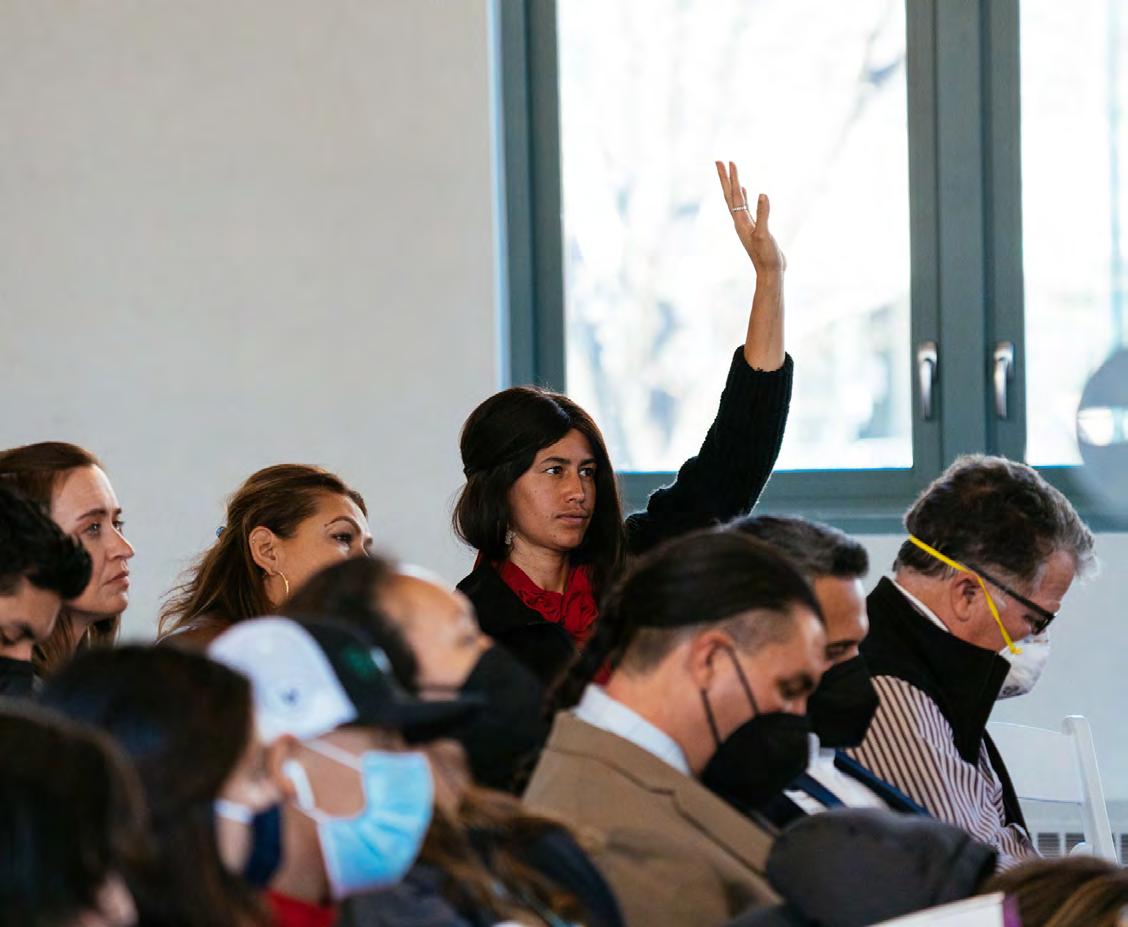

Environmental Protections
Vulnerable communities who have been directly affected by pollution SHOULD get additional environmental protections to make sure their communities are no longer exposed to the negative impacts of pollution
POLITICAL SYSTEMS/CIVIC ENGAGEMENT


In 2023, 57% of the 1,600 voters polled believe the nation is currently headed in the wrong direction, compared to 30% who think it is headed in the right direction. Those figures are nearly identical to 2022. Likewise, Latino voters continue to have a more positive view about the state of Colorado and their individual counties, as they are more likely to believe those two governments are on the right track rather than headed in the wrong direction (see figure 11). In 2023, 53% of Latinos believe the state of Colorado is going in the right direction, and 49% believe their county is going in the right direction — both figures up slightly from 2022.
The perceived state of the nation among Latino voters is likely driven by the prevailing polarized political climate underscored by unprecedented political violence and misinformation surrounding the fairness of our election systems. The atmosphere is generating concern and fear among Latino voters as we approach the 2024 election, including 81% of Latino registered voters expressing concern about the prospect of a mass shooting that targets the Latino/immigrant community.
Right Track/Wrong Track
Generally speaking, do you think things in each of the following places are on the right or wrong track?
Similarly high percentages are concerned about political unrest and violence (see figure 12).
The annual survey also includes favorability measures for all of the major federal and state branches of government. As shown in figure 13, federal positions
Issues of Concern
using language that divides people, encourages discrimination and violence against immigrants
candidates who refuse to accept election results even when they lose
People who refuse to believe election results when the candidate they support loses
How concerned are you with each of the following in the next few years? Somewhat
Court continue to be ranked incredibly ineffective by Latino registered voters in Colorado. Although all three have low favorability, the U.S. Supreme Court (SCOTUS) is particularly notable. Overall, 43% of Latino voters rate SCOTUS as “slightly effective” or “not effective at all,” which is the highest in that category across all political institutions. That percentage is very similar to the 2022 survey, an election year where abortion policy proved to be a strong mobilizing factor for Latino voters following the court’s Dobbs v. Jackson decision.
Meanwhile, also in line with 2022, institutions at the state and local levels — Colorado’s Governor, in particular — were viewed as more effective at addressing the issues important to the Latino community. While the overall effectiveness of the Governor’s office slipped to 44% in 2023 compared to 51% of respondents rating it as “very” or “somewhat effective” at addressing Latino issues last year, that remains significantly higher than effectiveness ratings
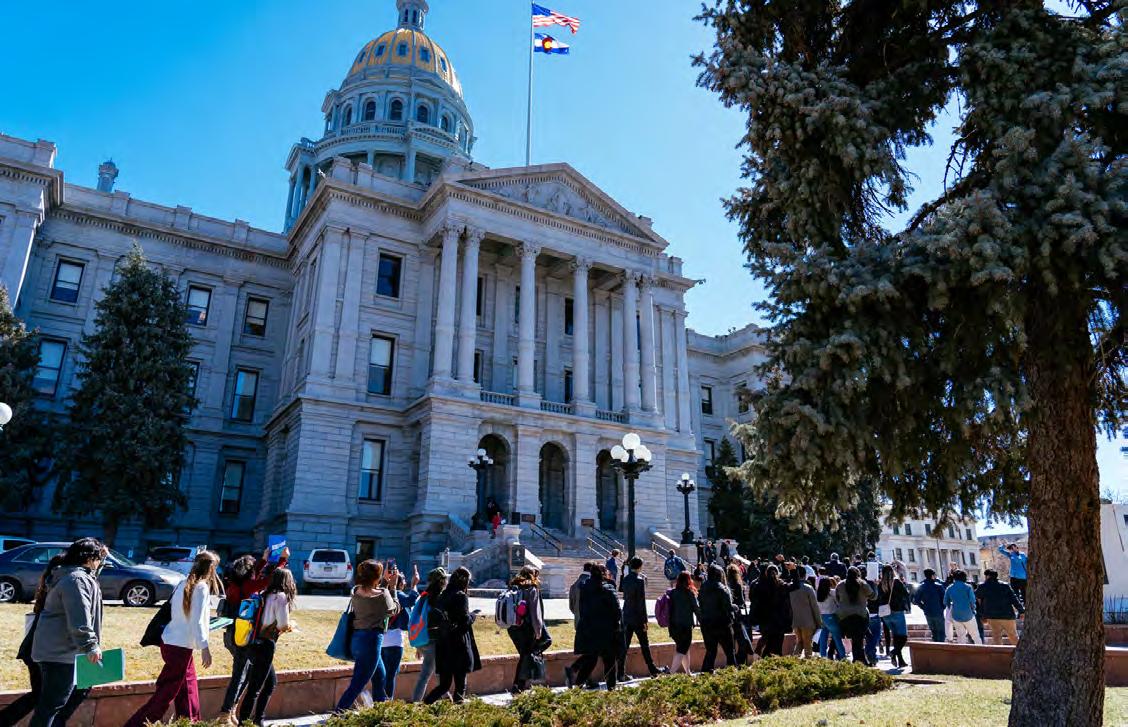
FIGURE 13

Effectiveness of Leadership
How effective are each of the following at addressing issues important to the Latino/Hispanic community in the U.S.?
of Congress (35% very or somewhat effective), SCOTUS (28% very or somewhat effective) and the President (35% very or somewhat effective), all of which measured similarly in 2022.
Although the survey is non-partisan in nature, it does provide some insights into how Latino registered voters view each of the major political parties. When asked which party is closest to their values, concerns, and priorities, Latino voters chose Democrats (49%) more than 2-to-1 over Republicans (22%). Another 28% of the Latino electorate does not believe either party shares their values, concerns, or priorities. In regard to general favorability, 58% of Latino registered voters in Colorado viewed the Democratic party more favorably, compared to 34% with a favorable view of the Republican party (see figure 14).
The poll also measured political ideology to better understand trends over time and factors that may influence changes among Latino voters — notably to identify changes in political dynamics similar to those that shifted recent elections in states like Florida and Texas. Percentages around political ideology are almost evenly split this year as 36% of Latino voters consider themselves moderate, 30% liberal/ progressive, and 28% conservative. A plurality (43%) of those polled in 2023 say their political ideology has not changed in the past three years compared to 34% saying they have become more liberal and 24% who are more conservative.
Despite the rapid growth in eligible voter population and significant influence Latino voters have had on recent federal and state elections in Colorado, it is evident that Latino voter turnout has not yet reached its full potential. According to this year’s survey, half of Latinos have not yet been contacted by anyone about registering or voting, marking the third consecutive year that voter education and outreach efforts have fallen well short of where they ought to be. Traditional mobilization agents, including candidates and parties, are not working hard enough to court the Latino vote, surely impacting voter turnout and overall civic engagement.
In practical political context, support for ballot measures to be decided this fall is very strong, with 78% of Latino voters saying they support using a portion of the state’s surplus fund to cut property taxes for homes and businesses (Prop HH), and 75% in favor of taking extra tax revenue from tobacco and nicotine products to fund a free preschool program (Prop II). But unless they are mobilized, that support is unlikely to be recognized at the ballot box.
Views on Major Parties

ADDITIONAL FINDINGS
In addition to being the largest nonpartisan poll of Latino registered voters conducted in Colorado, this year’s poll covered a broad range of policy issues relevant to the Latino community, revealing some noteworthy results offering additional perspective on Latino voters in the state.
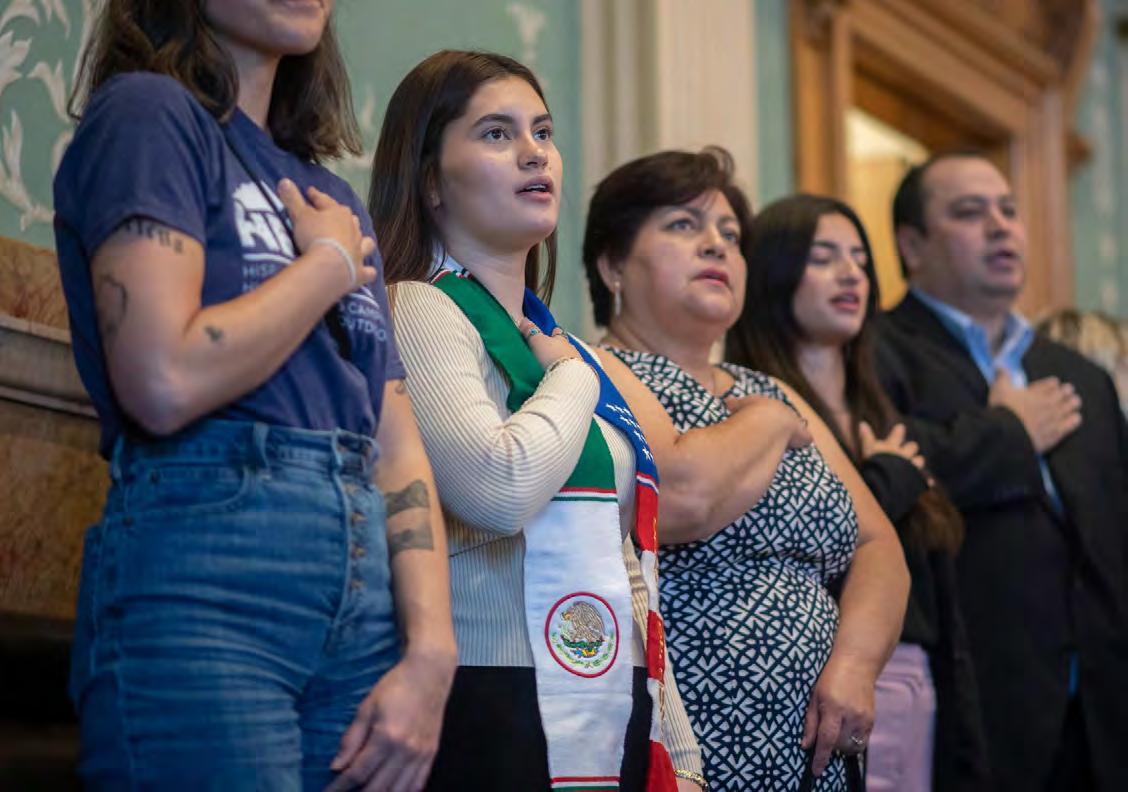
● Same-Sex Marriage: A 63% majority of Latino voters polled in 2023 say they are likely to support a future ballot measure changing the state constitution to keep same-sex marriage legal in Colorado. The result was nearly identical to our 2022 poll, when 62% of the Latino community expressed support for adding a state law to permanently protect same-sex marriage.
● Gun Violence: Addressing gun violence and mass shootings remains a top priority issue for Latino voters, ranking as the top issue not related to the economy for the second year in a row. Gun
violence is the third most important issue the Latino community believes Congress and the President should address in 2023, and the fourth most important issue — just behind homelessness — for the Governor and State Legislature to address. While the 2023 survey included fewer questions about gun violence, data from 2022 showed overwhelming, bipartisan support for a variety of gun safety measures, including mandatory, universal background checks for all firearm sales (85%) favored almost equally between Republicans (85%) and Democrats (89%). There was also strong support for a 10-day waiting period to purchase a firearm (75%), and for overall stricter laws covering the sales of guns in Colorado, including 66% support for an outright ban on the purchase of assault rifles. While the state did pass some gun safety measures in 2023, it’s reasonable to assume that Latino voters still believe legislative efforts continue to fall short.
INSIGHTS BY CONGRESSIONAL DISTRICT*
The poll’s large sample sizes allow for direct comparisons to be made across congressional districts in Colorado, although it is important to note that the relatively small population density across some districts led to fewer than 100 completed interviews
CONGRESSIONAL DISTRICT 1
● Protecting women’s reproductive rights (+4%) and addressing discrimination and racial justice (+3%) are higher federal priorities to residents of CD-1
● More likely to be “very concerned” about a January 6th-type riot at the US capitol happening again (+9%) and large protests across the country that could become violent (+4%)
● More likely to agree that “the federal government should do more to support new immigrants or refugees who have recently arrived to the United States” (+4%)
CONGRESSIONAL DISTRICT 2
● Protecting women’s reproductive health/ abortion rights is more important in federal priorities (+7%) and state priorities (+12%)
● Addressing gun violence and mass shootings is more important in state priorities (+9%)
● More likely to strongly agree that “The federal government should do more to support new immigrants or refugees who have recently arrived to the United States” (+11%)
● More likely to support creating a law to more clearly define when a landlord can justly evict a renter (+7%) and creating legal protections to prevent unjust evictions of renters (+8%)
● Much less likely to support a candidate that opposes rent control and rent stabilization to address the housing crisis
● More likely to be mobilized by knowing that “Colorado passed the Reproductive Health Equity Act which protects reproductive rights and keeps abortion legal in Colorado.” (+11%).
in CD5, CD6 and CD7. Due to the small sample sizes potentially impacting the reliability of inferences drawn in those specific districts, we have not included them in this summary.
● More likely to have had rent increases in the past year (+3%) and more likely to have seen rent increases between $100 and $299
● More likely to support Colorado creating an ongoing or permanent fund to help mobile home park residents purchase their mobile home parks (+4%)
● More likely to agree that cities and towns should be required to build more affordable housing near jobs, schools, and public services (+3%)
● More likely to have faced discrimination in healthcare due to immigration status (+3%, language/accent (+9%), and sexuality (+5%)
CONGRESSIONAL DISTRICT 3
● More likely to have a worse financial situation than last year (+3%)
● More likely to believe that Colorado (+6%) and the United States as a whole (+5%) are going in the wrong direction
● 4% less likely to have been reached to ask their thoughts about politics or policy in the state
● More likely to agree that Congress should pass a law to provide a pathway to citizenship to Dreamers and DACA recipients (+4%) and that President Biden should issue an executive order to stop deporting undocumented immigrants who have not committed a crime, and who are working and contributing to the U.S. (+4%)
● More likely to support the state taking actions to make sure that cities and towns are building more affordable types of housing (+4%)
● 8% less likely to support a candidate that has a record of opposing/blocking policies that are popular with Latinos/Hispanics
● Also 8% less likely to support a candidate that opposes rent control and rent stabilization to address the housing crisis
CONGRESSIONAL DISTRICT 4

● Creating affordable and attainable housing is a higher federal priority (+8%), relative to the total sample
● More likely to NOT be able to afford (or barely be able to afford) where they live (+8%)
● More likely to think that the state of Colorado is going in the wrong direction (+20%)
● More likely to be concerned about a mass shooting that targets the Latino or immigrant community (+5%)
● More likely to agree that the federal poverty level is too low for where they live (+7%)
● More likely to agree that “Vulnerable communities who have been directly affected by pollution SHOULD get additional environmental protections to make sure their communities are no longer exposed to the negative impacts of pollution” (+8%)
● 9% less likely to support a candidate that opposes legislation to support immigrants
● More likely to have no information about energyefficient appliance rebates, how to improve home energy performance or where to buy/charge electric vehicles
● More likely to have faced discrimination in healthcare due to immigration status (+9%)
● More likely to have had the Reproductive Health Equity Act positively impact them or someone they know (+10%)
CONGRESSIONAL DISTRICT 8
















● Improving wages and income is a more important federal priority to residents of CD-8 (+10%), as is Medicare and Social Security (+3%)
● In terms of state priorities, improving wages and income (+4%) and creating affordable and attainable housing (+6%) are higher priorities
● More likely to have a worse financial situation now relative to one year ago (+3%)
● 5% less likely to have been reached out to ask for their thoughts about politics or policy in the state
● More likely to have had their rent increase (+4%)
● More likely to believe that the minimum wage should be increased (+8%) and more likely to agree that the federal poverty rate level is too low for where they live (+6%)
● More likely to be concerned about a lack of resources to prepare themselves or their children for college (+5%), banning books that discuss historical events such as slavery or the Chicano rights movement (+3%), and the little effort by school leaders to involve parents in the education of their children (+3%)
● More likely to have faced discrimination in healthcare due to their race/ethnicity (+8%)
*Some congressional breakouts (CD-5, CD-6 and CD-7) have smaller sample sizes (n>100) which may affect reliability and therefore are not included here
INSIGHTS BY REGION
DENVER-METRO
● More likely to have had their rent go up in the past year (+4%)
● More likely to support a ballot measure making abortion rights stronger in Colorado by allowing state-funded insurance programs to cover abortion costs (+3%)
● More likely to support a ballot measure changing the state constitution to keep same-sex marriage legal in Colorado (+3%)
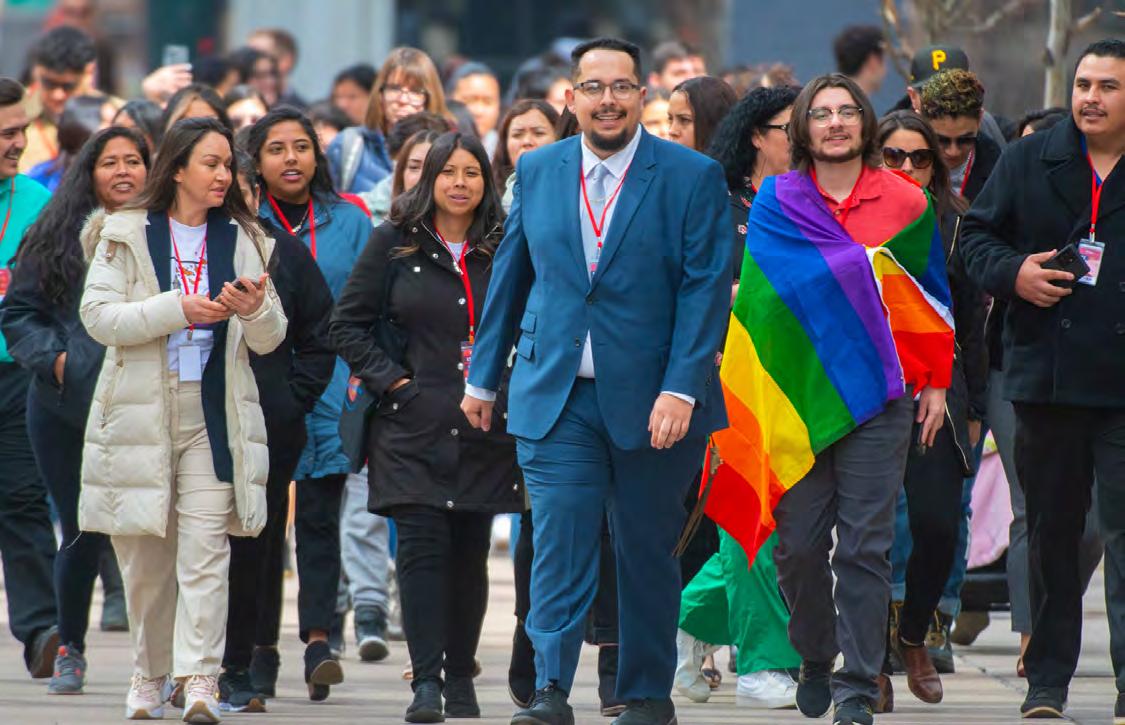
● More likely to have faced discrimination in healthcare due to their race/ethnicity (+6%) and their language/accent (+5%)
● More likely to have delayed or avoided getting needed medical care they felt they needed due to the cost (+4%)
● More likely to be mobilized by the laws that have been passed around the nation to limit or ban abortion (+5%)
NORTHEAST REGION
● In terms of state priorities, the NE region places a higher priority on addressing gun violence and mass shootings (+5%)
● More likely to either not be able to or barely be able to afford where they live (+6%)
● More likely to agree with several immigration policies, including that refugees and asylum seekers should be able to legally apply for entry at the U.S. border and have their individual case heard (+5%), that Congress should pass a law to provide a pathway to citizenship to Dreamers and DACA recipients (+3%), and that Congress should pass a law to provide a pathway to citizenship for undocumented farm workers (+2%)
● 5% less likely to support candidates that oppose rent control and rent stabilization to address the housing crisis
● 10% less likely to support candidates that oppose legislation to support immigrants.
WEST REGION

● Federally, addressing the rising cost of living/ inflation is a higher priority (+6%)
● Education is a higher priority for state issues (+5%)
● Congress should pass a law to provide a pathway to citizenship to Dreamers and DACA recipients (+7%)
● The federal government should do more to support new immigrants or refugees who have recently arrived to the United States (+10%)
● The federal government should do more to support undocumented immigrants who have lived, worked and paid taxes in the U.S. for most of their lives (+8%)
● President Biden should issue an executive order to stop deporting undocumented immigrants who have not committed a crime, and who are working and contributing to the U.S. (+6%)
● If Congress does not pass immigration reform, President Biden should issue an executive order to provide legal permits to allow undocumented immigrants to live and work in the U.S. without fear of deportation (+7%)
● 90% support for the state taking actions to make sure that cities and towns are building more affordable types of housing (+8%)
● 14% less likely to support a candidate that opposes legislation to support immigrants
SOUTHEAST REGION








● Homelessness is a key state priority for people in the SE region (+4%)
● More likely to have a worse financial situation than last year (+6%)
● 5% more likely to believe that the US is going in the wrong direction
● Higher support for requiring landlords to compensate tenants if the landlord breaks the lease and/or evicts a renter without cause (+4%) and the state taking actions to make sure that cities and towns are building more affordable types of housing (+3%)
● More likely to have no information about energyefficient appliance rebates, how to improve home energy performance or where to buy/charge electric vehicles
RESPONSES BY REGION
INSIGHTS BY AGE: YOUNG ADULTS 18-29
● Higher rating of “protecting women’s reproductive health/abortion rights,” (+7%) “protecting immigrant rights,” (+7%) and addressing “discrimination/racial justice” (+6%) for federal priorities, relative to the total sample
● A similar story for state priorities, with a higher proportion rating protecting women’s reproductive health/abortion rights as a top priority in Colorado (+5%)
● Less likely to think that the United States is going in the right direction (-5%), but more likely to report that the state of Colorado is going in the right direction (+2%)
● More likely to have been reached out to by friends, family, and coworkers to ask for their thoughts about politics or policy in Colorado (+6%)
● More likely to “strongly agree” that Congress should pass a law to provide a pathway to citizenship for undocumented farm workers (+6% strongly agree)
● More likely to “strongly agree” that the federal government should do more to support new immigrants or refugees who have recently arrived to the United States (+6% strongly agree)
● More likely to “strongly agree” that the federal government should do more to support undocumented immigrants who have lived, worked and paid taxes in the U.S. for most of their lives (+9% strongly agree)
● More likely to “strongly agree” that President Biden should issue an executive order to stop deporting undocumented immigrants who have not committed a crime, and who are working and contributing to the U.S. (+6% strongly agree)
● More likely to “strongly agree” that if Congress does not pass immigration reform, then President Biden should issue an executive order to provide legal permits to allow undocumented immigrants to live and work in the U.S. without fear of deportation (+9% strongly agree)
● More likely to have had their rent increase by $200-$299 (+5%)
● More likely to say that neither party is aligned with their values, concerns, and priorities (+4%)
● More likely to not know if they’ll support “Using a portion of the state’s surplus fund to support local governments and school districts that will make it possible to cut property taxes for homes and businesses, and lower property taxes for seniors” (+6%)
● More likely to not know if they’ll support “Taking extra tax revenue from tobacco and nicotine products (up to $23.6 million) to fund a free Preschool Program” (+5%)
● More likely to be “very likely” to support changing the state constitution to keep same-sex marriage legal in Colorado (+4%)
● More likely to have faced medical discrimination in healthcare due to their race/ethnicity (+4%), language/accent (+7%), sexuality (+6%), and gender (+4%)
● More likely to have skipped needed medical care due to the cost (+7%)
● Less likely to know where to get non-emergent medical care ( +6%)
SOCIO-DEMOGRAPHIC PROFILE OF THE LATINO COMMUNITY IN COLORADO
The annual survey includes a host of demographic variables to help provide a socio-demographic profile of the Latino community in the state.
Although Colorado has experienced significant population growth driven largely by Latino immigrants
moving into the state, 57% of respondents have lived in Colorado for more than 20 years, and another 27% between 10-20 years. Among those who have lived in the state for at least 10 years, 68% report that they are from families who have lived in Colorado for many
generations. The most common national origin among Latinos in Colorado is Mexican at 52%, followed by Spanish at 15%.
Regarding country of origin, 11% of respondents reported that they were born outside of the United States, and 2% were born in Puerto Rico. There is a close personal connection to the undocumented population between Latinos in Colorado, regardless of their immigration status. Roughly half of respondents (45%) reported that they know someone in their close personal network who is undocumented, including 21% who have a family member who is undocumented and 24% who have a friend in their network.
It’s important for civic leaders and organizations interested in communicating with the Latino community in Colorado to do so bilingually, as 79% of all respondents reported that they speak Spanish in their homes at least sometimes, with 36% reporting they do so every day. Overall, 17% of respondents preferred to take the 2023 poll in Spanish.
The most common religion among Latinos in Colorado is Catholic (37%), followed by Christian/Protestant (25%).
Atheist or non-religious was the third-most common survey response (15%), with another 13% reporting that, while they are spiritual, they do not practice a religion.
Economically, there is a higher percentage of Latino households across the state that make less than $20,000 (9%) than make $150,000 or more, which is a good overall indicator of the economic standing of the Latino community. Just over a third (35%) of Latinos earn between $20,000 and $60,000, with 28% earning between $60,000 and $99,999.
The poll was designed to be nonpartisan, however respondents were asked to share their affiliations with and views on political parties so we can explore differences based on political values. The final poll data had weights applied to bring the data into direct balance with Census estimates. In 2023, 50% in the poll self-identified as Democrat, 19% Republican, and 30% independent or another party. This is nearly identical to the self-ID partisanship levels from the surveys in 2021 (46% D, 17% R and 30% independent or another party) and 2022 (47% D, 17% R, and 28% independent or another party).
MEDIA OUTREACH STRATEGIES TO IMPROVE ENGAGEMENT OF LATINOS
Latinos seek out information from a wide variety of outlets, so communication strategies need to be diverse in their approach.
The most commonly used source of information among the sample is traditional television and radio, particularly among older Latinos in the state. However, a growing number of Latinos (23%) use news apps on their phones or receive news and information updates through digital sources such as YouTube (31%) several times a day, with even greater popularity among Latinos under the age of 40. Facebook is also used several times a day by a third of all Latinos (33%), with this outlet most common among Latinos between the ages of 30-50.
While the majority of respondents (82%) typically get political information in English, it will also be important for political leaders and organizations interested in communicating with the Latino community in Colorado to do so bilingually. Overall, 65% of Latinos surveyed said that they use Spanish language television or radio to get information, news or current events. This includes 16% who do so several times a day and 43% who tune in at least a few times a week. Furthermore, 79% of Latino voters reported that they speak Spanish in their homes at least sometimes, with 36% saying they do so every day.
The 2023 Colorado Latino Policy Agenda (CLPA) is an annual nonpartisan report produced by Voces Unidas and Colorado Organization for Latina Opportunity and Reproductive Rights (COLOR) as part of a statewide public research initiative. Polling and analysis was overseen by Dr. Gabriel Sanchez and Dr. Matt Barreto from BSP Research, LLC.
Voces Unidas de las Montañas is a 501(c) (3) nonprofit based in Glenwood Springs, Colorado. We focus on organizing and advocacy, policy and research, leadership, and voter engagement programs.

Learn more at vocesunidas.org
Colorado Organization for Latina Opportunity and Reproductive Rights (COLOR) is a community-rooted 501 (c)(3) nonprofit organization that works to enable Latinx individuals and their families to lead safe, healthy and self-determined lives.

Learn more at colorlatina.org .
Methodology Statement: The poll of 1,600 total completed interviews with Hispanic/Latino adults in the state of Colorado resulted in an overall margin of error of +/- 2.4%. Poll respondents were randomly selected in a blended approach including web-based and telephone interviews (both landlines and cell phones) and the poll was available in both English and Spanish at the respondent’s discretion. The poll was designed with an oversample of Latinos who live in rural counties of the state and large sample sizes allow for comparisons to be made by region/congressional district. Data were compared to the best-known estimates of the U.S. Census Current Population Survey (CPS) for demographic profile of Colorado adults and post-stratification weights were applied to bring the data into direct balance with Census estimates. The poll was led by Dr. Gabriel Sanchez and Dr. Matt Barreto from BSP Research, LLC.
